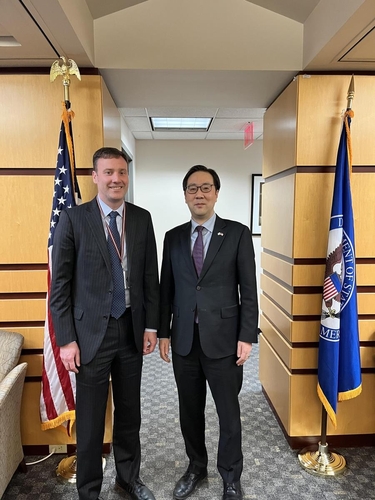- California Assembly OKs highest minimum wage in nation
- S. Korea unveils first graphic cigarette warnings
- US joins with South Korea, Japan in bid to deter North Korea
- LPGA golfer Chun In-gee finally back in action
- S. Korea won’t be top seed in final World Cup qualification round
- US men’s soccer misses 2nd straight Olympics
- US back on track in qualifying with 4-0 win over Guatemala
- High-intensity workout injuries spawn cottage industry
- CDC expands range of Zika mosquitoes into parts of Northeast
- Who knew? ‘The Walking Dead’ is helping families connect
S. Korea, U.S. launch task force to block N. Korea’s nuclear, missile programs
South Korea and the United States have launched a task force to effectively block North Korea from financing its unlawful nuclear and missile programs, the foreign ministry said Wednesday.
The inaugural meeting of the South Korea-U.S. bilateral Enhanced Disruption Task Force was held in Washington, D.C., on Tuesday (local time) with over 30 officials in areas of diplomacy, intelligence, sanctions and maritime interdiction, according to the ministry.
During the meeting, the two sides discussed ways to counter illicit efforts by North Korea to circumvent sanctions concerning the procurement of refined petroleum, stressing that importing refined oil in excess of the U.N.-mandated cap violates U.N. Security Council (UNSC) resolutions.
They also highlighted the need for close cooperation to counter the North’s ability to procure petroleum, including from Russia, saying it directly contributes to the reclusive country’s military readiness and its weapons development.
The two sides also agreed to consider slapping independent sanctions on individuals and companies involved in smuggling refined oil to North Korea.
In a separate release, the State Department said that through the task force, Seoul and Washington are pursuing a wide range of joint actions to disrupt the North’s refined oil procurement networks, including by exposing its sanction evasion activities, reviewing options for autonomous sanction designations and engaging regional actors that facilitate the North’s oil procurement either knowingly or unwittingly.
The two sides also discussed future areas of focus, including disrupting the North’s illicit overseas coal sales, it added.
Under UNSC sanctions, the North is banned from importing more than 500,000 barrels of refined petroleum per year.
In a report released early Thursday, the panel under the U.N. Security Council sanctions committee on the North estimated North Korean-flagged tankers would have delivered 1,523,381 barrels between Jan. 1 and Sept. 15 last year.












